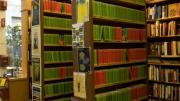The display room of Harvard University Press (HUP)—a fixture in the Holyoke Center arcade since 1966—and before that, on Dunster Street since 1948—closed on June 17. The proximate cause was the decision by two of the three employees, manager Jeff S. Flemming ’73 and Marygail Parker, to accept the University’s early-retirement program; their third colleague, Barry Duncan, was among the Press staffers laid off. The staffing transition came at a time when book sales have declined (in common with retail sales generally)—putting pressure on the Press, which operated the display room more as a customer service and a publicity venue than as a money-making venture. (Longer term, of course, book sales have also increasingly migrated to electronic outlets; Amazon is HUP’s largest customer.)
The books themselves remain readily available, and HUP’s list can be browsed comprehensively at its website, www.hup.harvard.edu. What is lost, however, is the overwhelming visual impression of the whole Loeb Classical Library in its green (Greek) and red (Latin) cases and dust jackets, and the nearby bright blue of the newcomer, the I Tatti Renaissance Library. It becomes more difficult to assemble, at a glance, the depth of the works published in Slavic studies, or in higher education, or music, or landscape architecture. This was a sturdy place—brick floors, concrete ceiling, solid shelves—in which to encounter Igor Stravinsky and Eudora Welty, among all the scholarly volumes. Above all, as showed by the store’s sign—a stack of books disordered by rummaging, rather than positioned neatly but unopened—it was a place about serious reading and publishing: a very good thing for a university-press bookstore embedded in the center of Harvard’s campus.












